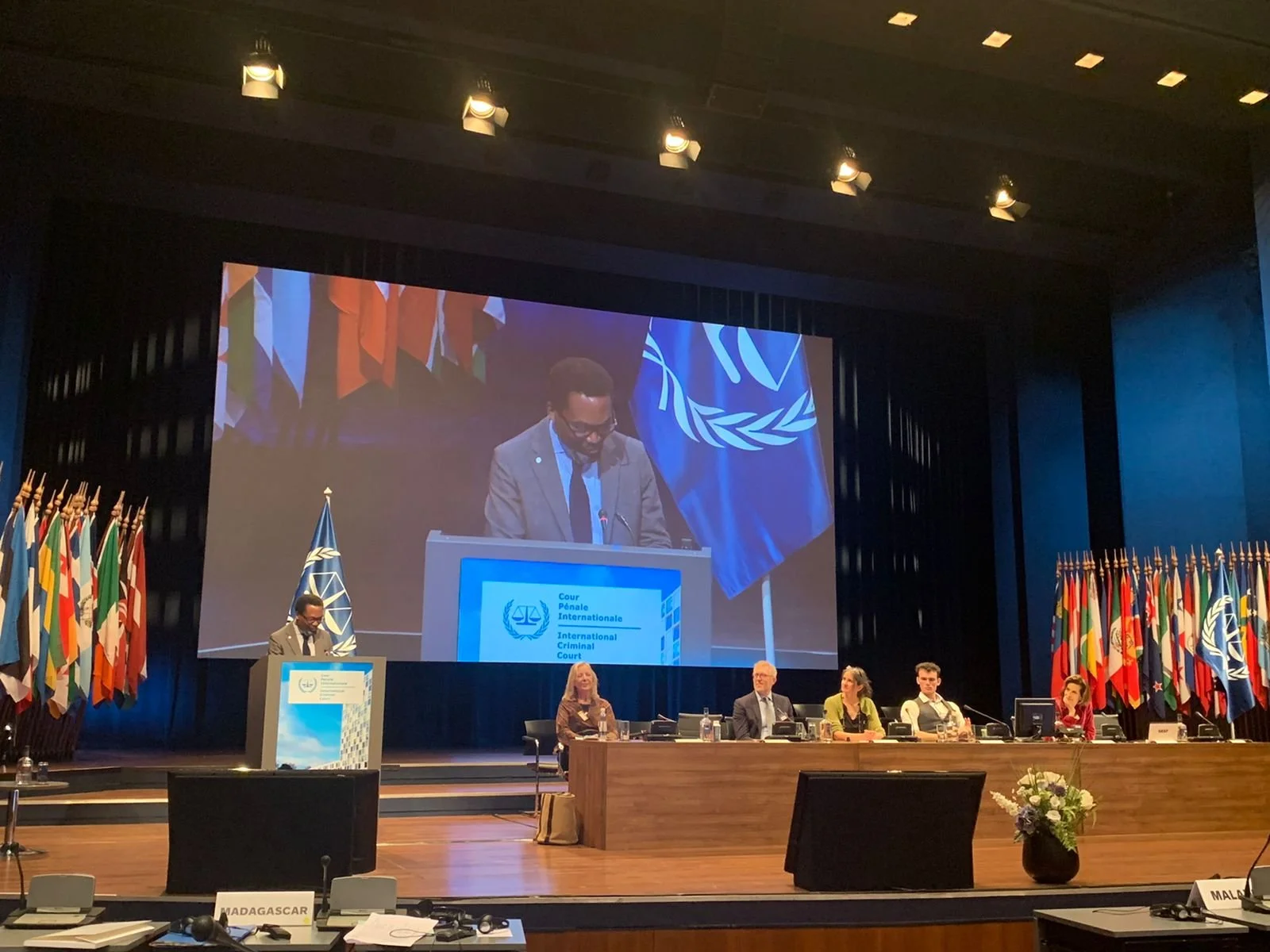21st SESSION OF THE ASSEMBLY OF STATES PARTIES
6 December 2022
Name of the Event: Global crisis and the potential of the ICC: relevance of ecocide as the fifth crime (organized by Vanuatu, Parliamentarians for Global Action (PGA) and Stop Ecocide Foundation)
Report by: Kateryna Kyrychenko, Program Manager, and Henry Smith, Research Associate, PILPG
Speakers:
Moderator: HRH Princess Esmeralda of Belgium
Mrs. Elisabeth van Fliet, Honorary Consul of Vanuatu in the Netherlands
Professor Philippe Sands KC, University College of London
Professor Chile Eboe-Osuji, former ICC president
Professor Darryl Robinson, Queens University Canada
Jojo Mehta, Chair of the Stop Ecocide Foundation
Josh Oxby, UN Youth Advisor
Summary of the Event:
The moderator of the event, HRH Princess Esmeralda of Belgium, opened the session noting that the Rome Statute was established with the intention to address the most serious crimes that affected the international community. Damage to the environment usually is linked to conflict, however, it harms all international communities as a whole, national communities, especially minorities. In the context of the ecological crisis, the destruction of environments constitutes these types of crimes as they affect local communities across the globe, particularly indigenous peoples and other minorities. Therefore, the Princess noted that it is very much relevant to include ecocide as the fifth crime within the scope of the Rome Statute. She mentioned that recognition of the importance of this matter is growing among State Parties. She laid out that the speakers would address the global progress of the ecocide agenda, the importance of the recognition of ecocide as an international crime within the ICC framework, and the potential of this recognition for the fight against the global environmental crisis.
The Honorary Consul of Vanuatu in NL, Mrs. Elisabeth van Fliet, reiterated support for the ICC and its mission, and highlighted the ICC’s potential for fighting the environmental crisis. As an island state, Vanuatu is losing land to rising sea levels, witnessing the death of coral reefs, and experiencing deadly cyclones and extreme weather conditions. For Vanuatu, as for many other vulnerable states, the ecological crisis is already an existential one. For these reasons Vanuatu is committed to bringing the matter before international courts and organizations. Vanuatu was the first state to raise the issue of ecocide before the ASP in 2019 and advocated for its inclusion to the Rome Statute. They are committed to raising the issue before the International Court of Justice and are asking the United Nations General Assembly to support a resolution that protects the rights of future generations, and a treaty proposal for the non-proliferation of fossil fuels.
Professor Philippe Sands made a parallel between the attempts to define and codify ecocide with the efforts to do so with genocide, crimes against humanity, and aggression. The international community came together after these terrible conflicts and created those crimes to protect humans from atrocities. However, there is a gap left now in relation to the protection of the natural environment. The existing legal framework is completely anthropocentric and does not deal with challenges to biodiversity, to the atmosphere, and the marine environment. Sands pointed out that forging a definition of the crime of ecocide will provide a basis to move forward in that direction, but that it should be a broad definition that all states could agree on and that would benefit both developed and developing states. Thus, the definition established is: “unlawful acts committed with the knowledge that they would cause severe, widespread, and long-standing damage to the environment.” Sands highlighted that people should not be starry-eyed about the ability of international criminal law to solve all environmental problems, but that it will change consciousness and allow them to understand that the international community agrees that certain forms of damage to the environment are not acceptable. He also noted that, while the crime of ecocide would not be applicable to corporate acts, corporate officials could still be held individually responsible. Sands mentioned that the amendment of the Rome Statute is the preferred route, as the negotiations of draft conventions can take a long time. He underlined that the international community is living in yet another moment of change, a new convention on crimes against humanity is being drafted, a crime of aggression tribunal is being proposed, and it is important to put the environment also at the center of these changes. Sands concluded by acknowledging the special interest of the youth, who are energized by matters of environmental protection.
Professor Chile Eboe-Osuji, former ICC President, supported the idea and importance of the inclusion of ecocide (in a broad, non-anthropocentric sense) to the Rome Statute. He emphasized that we need to look beyond the ‘cide’ in ecocide and it should be ANY unlawful destruction of the environment that is included in the definition. Judge Eboe-Osuji advocated for the extension of the notion of ecocide to peaceful times (thus illegal destruction of the environment not only in wars would be covered by the new definition).
Josh Oxby, UN Youth Advisor, has made an intervention on behalf of youth, mentioning that a powerful tool in tackling climate change issues would be the acknowledgment of ecocide as one of the gravest international crimes. There is huge urgency and injustice (as indigenous people, youth and women are always disproportionally most affected by climate change) when tackling the issue of climate change.

